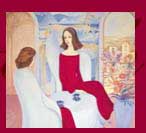|
Beyond Belief
By Elaine Pagels
New York, Random House
2003
Review published in Catholic New Times, October 19, 2003
Elaine Pagels is a historian of religion and a renowned scholar. She is also someone whose personal religious experience matters deeply to her. In her latest book Beyond Belief Pagels charts her spiritual journey, a journey that begins deep inside her heart broken by the fatal illness of her young son. In the midst of grief and rage, Pagels experienced hope—a moment of grace in the Church of Heavenly Rest. Somewhat paradoxically the moment of grace didn’t bring Pagels anything like rest; rather, it generated a burning question about the nature of Christianity and religion itself, which in turn generated a host of corollary questions about the nature of belief.
Pagels invites the reader to journey with her back into our collective Christian past to see how, when and perhaps why the beliefs of early Christian communities became formal and fixed creeds several centuries later. At each stage of the journey Pagels invites us to wonder with her, not only about the fine points of theological debate, but about the debaters themselves, the ancient protagonists of our collective Christian story, about their human response to inner impulses, to historical realities and, most particularly and urgently, to each other. The leitmotif of Beyond Belief is the nature of heresy, the dark sister of orthodoxy. Ireneaus, second-century bishop of Lyons, saw complementary visions of the divine as competing and unacceptable visions. Pagels examines the role Ireneaus played in determining canon and creed.
Now, two decades after the publication of her acclaimed Gnostic Gospels [1979], Pagels looks again at the texts found in Nag Hammadi in 1945. This time she examines them in the light of subsequent scholarship. Her deeper heart/mind questions function as relay stations which direct each stage of her exploration. In this reprise Pagels gives Ireneaus a gentle scholarly rebuke for labelling as “evil interpretations” such works as The Gospel of Truth, the Round Dance of the Cross, the Acts of John, the Gospel of Philip. She compares in detail the Gospel of Thomas, rejected by Ireneaus, with the Gospel of John, privileged by him. And she invites her readers to contemplate the consequences for Christian culture of Ireneaus’ repression of the diversity of belief manifested by early Christians. But Pagels does not take shortcuts through the complexity of the terrain of early Christianity. Ultimately, she shows compassion for Ireneaus’ situation and motivation. Though she finds no simple answers, Pagels refuses to evade emergent questions.
Beyond Belief is a book for lay scholars and professional scholars alike. Pagels functions as the lay readers’ expert guide to ancient sources. Such readers will see, perhaps for the first time, that our current culture of religious debate exists in full continuity with early Christian discourse. Issues such as literal versus mythic readings of scripture hotly debated today were similarly debated long ago. Pagels’ peers in academe already versed in the ancient sources will note that Beyond Belief is much more than a diligent reassessment of arcane data. Rather it is an eminent scholar’s very spirited and generously public act of ‘wrestling with God’.
|





